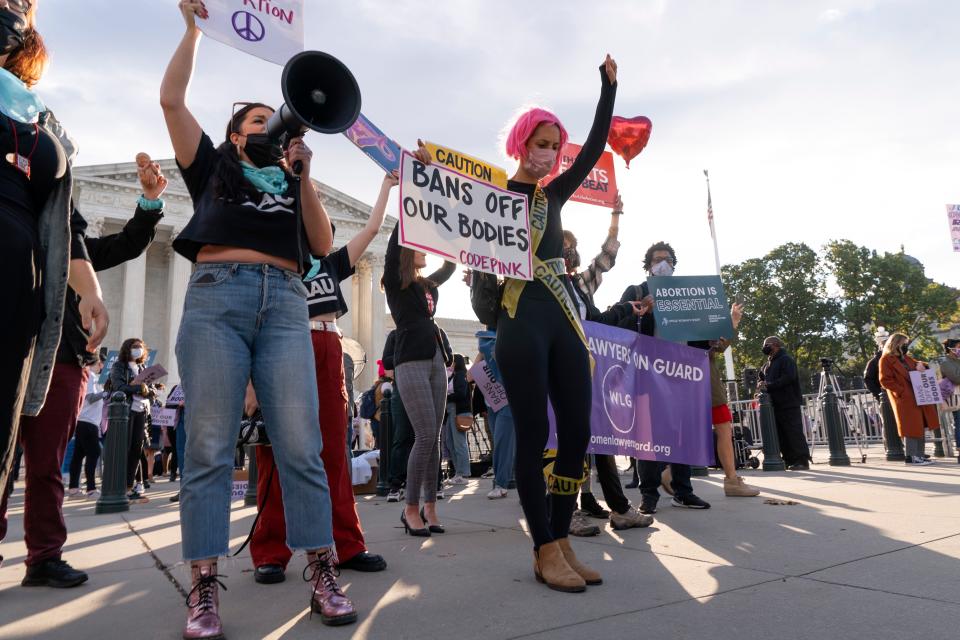Supreme Court's decision in abortion case will affect dozens of states beyond Mississippi
WASHINGTON – Dr. DeShawn Taylor considers herself fortunate to have spent a career working in states where the laws governing abortion are relatively straightforward.
But the owner of the Desert Star Family Planning clinic in Arizona knows the drama unfolding at the Supreme Court over Mississippi’s ban on most abortions after 15 weeks of pregnancy could have immediate consequences for her practice as well.
"With the court's current composition, I am very concerned," said Taylor, an OB-GYN, noting the 6-3 conservative advantage on the high court. "Abortion would be outlawed in Arizona if we lost Roe v. Wade, and I don't think people understand that."
The Supreme Court will hear arguments Wednesday in a major challenge to Mississippi’s 15-week ban. The justices' decision could quickly involve other conservative states that have approved abortion bans in anticipation of a ruling.

More: ‘Huge numbers’ of abortion cases heading to Supreme Court to test Roe v. Wade
Nine states, including Alabama, Arizona, Wisconsin and West Virginia, put abortion bans in place before the Supreme Court established a constitutional right to the procedure in its Roe v. Wade decision in 1973, according to the Guttmacher Institute, a research group that supports abortion rights. An additional eight states, including Idaho, Kentucky and Tennessee, approved "trigger bans" to criminalize the procedure if the court overturns Roe.
Four states, Arkansas, Mississippi, Oklahoma and Texas, have both a pre-Roe ban and a trigger ban on the books, according to Guttmacher.
Exactly how and when those laws would take effect varies by state and will depend a great deal on how the Supreme Court rules. A decision to uphold Mississippi’s 15-week ban but to leave in place the constitutional right to abortion, for instance, would almost certainly create confusion, a flood of lawsuits and legislation, experts said.
"You have to think that these trigger laws will trigger, so to speak, to the extent that there's some ambiguity about the court’s decision,” said Neal Devins, a law professor at William & Mary Law School.
A USA TODAY review of the trigger laws found the potential for ambiguity. Several states permit attorneys general to make a determination about whether the Supreme Court has overruled Roe v. Wade. Missouri permits the governor or the state Legislature, through a vote, to make that determination. Utah permits lawyers for the state Legislature to decide exactly what it is the high court has ruled.
Because the Supreme Court's decision may be something less clear than a black-or-white decision that overrules or upholds Roe, that could leave leeway for officials.
Eight of the trigger laws were approved in 2019 after the Senate confirmed President Donald Trump’s second nominee to the Supreme Court, Associate Justice Brett Kavanaugh. That corresponds with a broader push by conservative states to enact laws restricting the procedure to test the court’s commitment to Roe.
Roe established the right to obtain an abortion through the end of the second trimester, or roughly by the end of the 26th week of pregnancy. A subsequent decision in 1992 ended the trimester framework and ruled people could obtain an abortion until viability, the point when a fetus can survive outside the womb or about 24 weeks.
Roughly half of states have approved laws shortening that 24-week timeframe, most of which have been struck down by lower federal courts. Texas banned most abortions after six weeks of pregnancy – a law that has prompted two challenges pending at the Supreme Court.
Like Mississippi, lawmakers in Louisiana approved a ban on abortion after 15 weeks. Arkansas and Utah approved bans at 18 weeks.
Tennessee and Missouri approved "cascading" bans that attempt to prohibit abortions in two- or four-week increments.
Those laws have all been blocked by federal courts.
Hillary Schneller, a senior staff attorney at the Center for Reproductive Rights, which represents the clinic in the Mississippi case, said the laws underscore the "kitchen sink approach" that many conservative states take.
"The ultimate goal is just to ban abortion at any point or entirely," she said.
At least 14 states, including California, New York and Illinois, have approved laws protecting the right to abortion. A ruling overturning Roe would create different levels of access depending on the state.
That could be the case even if the Supreme Court doesn't overturn Roe. If the justices uphold Mississippi's law without ruling on whether the constitutional right to an abortion should be nullified, conservative state legislatures will almost certainly move with speed to adopt their own 15-week bans, experts said.
"If they uphold 15 weeks on its face and say that's the new standard, I think we'll see states pass 15-week limits," said Mallory Quigley with the anti-abortion group Susan B. Anthony List. "I think we'll continue to see pro-life advocates and lawmakers at the state level challenge whatever the status quo is going to be."
This article originally appeared on USA TODAY: Supreme Court's Mississippi abortion ruling could have ripple effect

